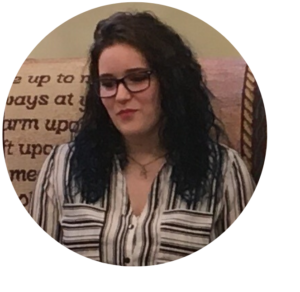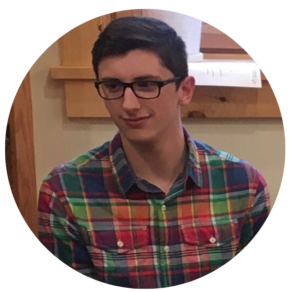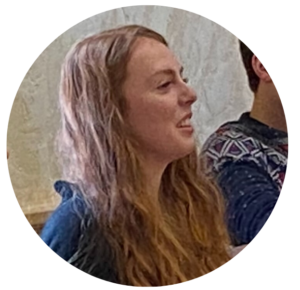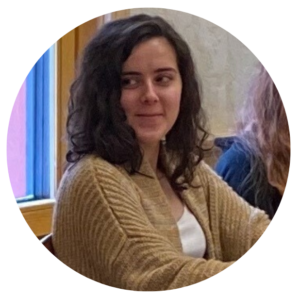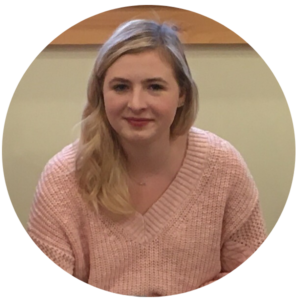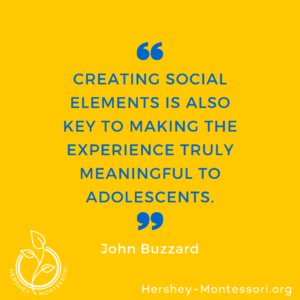Hershey News
Get an in-depth look at the rich learning experience of Hershey Montessori.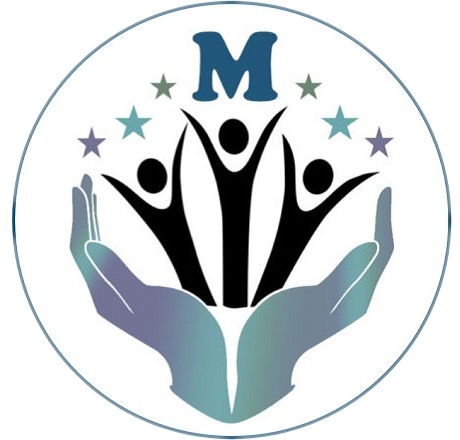
Hershey Montessori School Recognized by You Me Montessori
Hershey Montessori School is being recognized by You Me Montessori in a multi-part series of articles that document our school history and accomplishments. The founders of the organization are from South Africa and the United Kingdom. All currently work in Kuwait in the education field. Their website viewers are from around the world. You can read these articles by clicking on the series title below, or follow our Facebook page to see each article as it is published.
We extend our gratitude to Leon Caesar and his team for their interest in Hershey Montessori School and for their work in sharing Montessori with viewers around the globe.
Hershey Part 1 – Giant Footprints in Cosmic Education: The Journey of Hershey Montessori School
Hershey Part 2 – From Humble Origins to International Renown
Hershey Part 3 – Hershey Montessori School’s Concord Campus
Hershey Part 4 – Introducing The Farm School
Hershey Part 5 – The Cosmic Preparation Of The Huntsburg Campus
Hershey Part 6 – Reach For The Stars And Catch A Dream – The Vital Needs Of The Adolescent
Hershey Part 7 – The Value of Work and Economic Independence
Hershey Part 8 – Curriculum Frameworks I
Stay tuned for more in this series!
You can learn more about Hershey Montessori here on our website
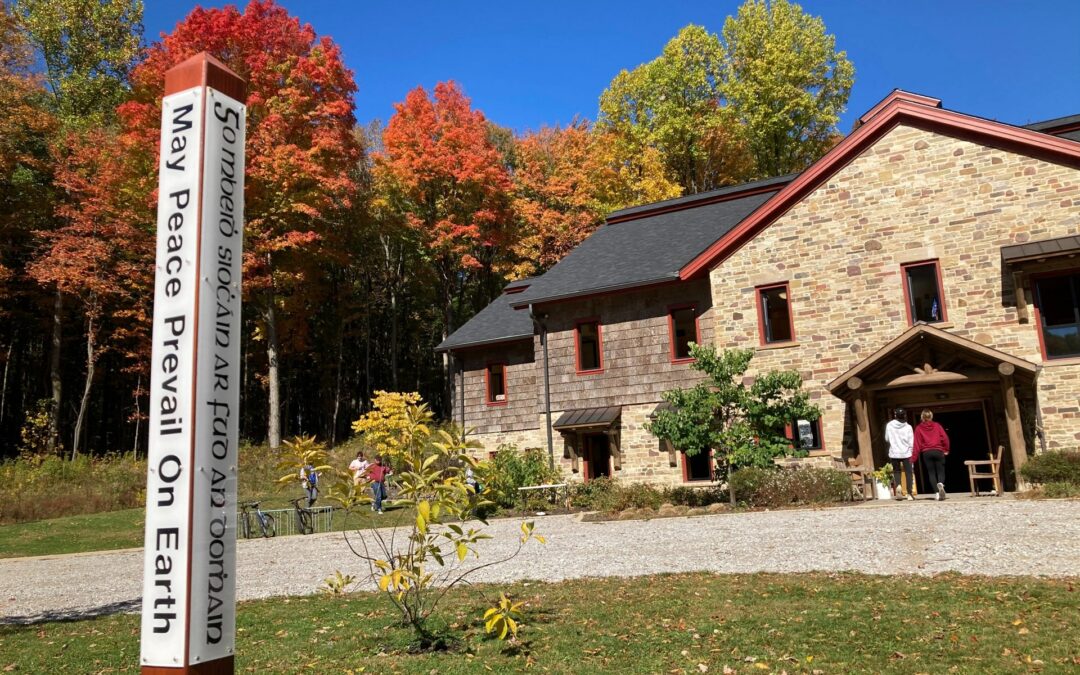
Hershey Montessori Students Hold Multi-School Election Conference
Hershey Montessori’s Upper School students recently held an Election Conference as part of their Humanities project. The conference brought students and experts together, virtually, to discuss issues around elections, specifically, reforming the election process and governance.
The students, led by Hershey guides John Buzzard and Jennifer Snead, connected with several adult experts, including Diane Silver from FairVote, an organization that champions electoral reforms to give voters greater choice, a stronger voice, and a representative democracy that works for all Americans; Cyndi Lucas of Citizen Congress, an app that lets users send their views to federal representatives and vote on bills, nominations, and questions introduced in Congress; Drez Jennings, a writer and expert on politics and media; and a former student of Buzzard, Sara Abdul-Rahim, Associate Director of Development at Georgetown University.
Students from Oak Farm Montessori in Indiana, Montessori School of Winston-Salem in North Carolina, and Beacon Academy in Illinois joined Hershey students and these professionals to discuss several areas of interest. Topics included election reform, ranked-choice voting, immigrant voting, felon disenfranchisement and vote by mail.
The conference was a collaborative effort that brought forth several issues that students were able to give voice to and engage in a critical thinking process that allowed them to express their ideas and concerns over the election process and governance.
Students were afforded the opportunity to give presentations that were followed by a question and answer session. A student action panel made up of students from all the schools also discussed how to take action and get their voices heard – a conversation that was facilitated by expert Cyndi Lucas and by Hershey student Kylie Golden-Appleton.
“We were thrilled with the turnout of students from other schools and the passion that they brought. The student action panel allowed the students to connect around their political ideas, and to find a community of young people eager to take political action. It felt like a way to take one of our responses to the COVID pandemic – working virtually – and make it a strength,” said Buzzard.
Hershey is pleased to provide students with experiential education opportunities that provide real-life skills and insights.
Both the students and experts gained better insight into these important, relevant topics and what our next generation of voters can do to improve them.
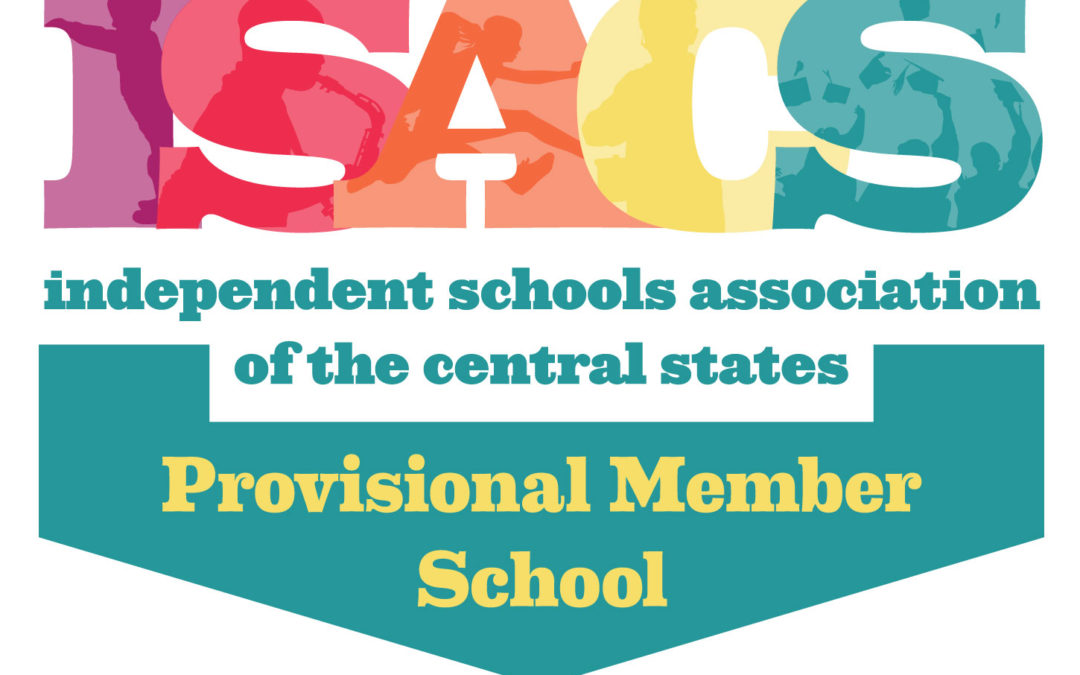
Hershey Montessori School Receives ISACS Provisional Member Status
Hershey Montessori School has good news to celebrate. ISACS, the Independent Schools Association of the Central States, has approved Hershey as a provisional member, which is the first step towards becoming an ISACS-accredited school. Hershey’s Steering Committee, which began its work in early 2019, is pleased to share this information with the Hershey community.
The Benefits of ISACS Membership
(From the ISACS website)
Moving Forward
With Provisional Membership approval, Hershey may now begin the process for full accreditation that involves preparation of the self-study report and accreditation visit. Getting to this stage required submission of our Provisional Membership Application (PMA). The PMA provides ISACS with an assessment of an organization that ensures it currently complies with the standards for full ISACS membership. The PMA required Hershey to provide documented evidence of compliance across 52 standards for membership, including our current policies and practices; mission, philosophy, and goals; school community; programs and activities, student services; governance and administration, personnel; and residential programs. We submitted our PMA in February of this year, which was reviewed and approved by the ISACS board in May.
The impetus to pursue ISACS accreditation came from the growing needs of our school. When Hershey’s Upper School was added five years ago, our community became keenly aware that resources and support provided to independent schools by ISACS would support our plans for continued growth. Our leadership then surveyed teachers, staff, and board members for input on the decision to begin the accreditation process. Together, we concluded that membership in ISACS would be of great benefit to our school and community.
Hershey’s ISACS Steering Committee includes Paula Leigh-Doyle, Laurie Ewert-Krocker, Tania Bertolone, Jennifer Finan, Valerie Raines, and Saren Peetz.
We look forward to the added value this organization will bring to our community.
To learn more about Hershey Montessori, visit our about page here
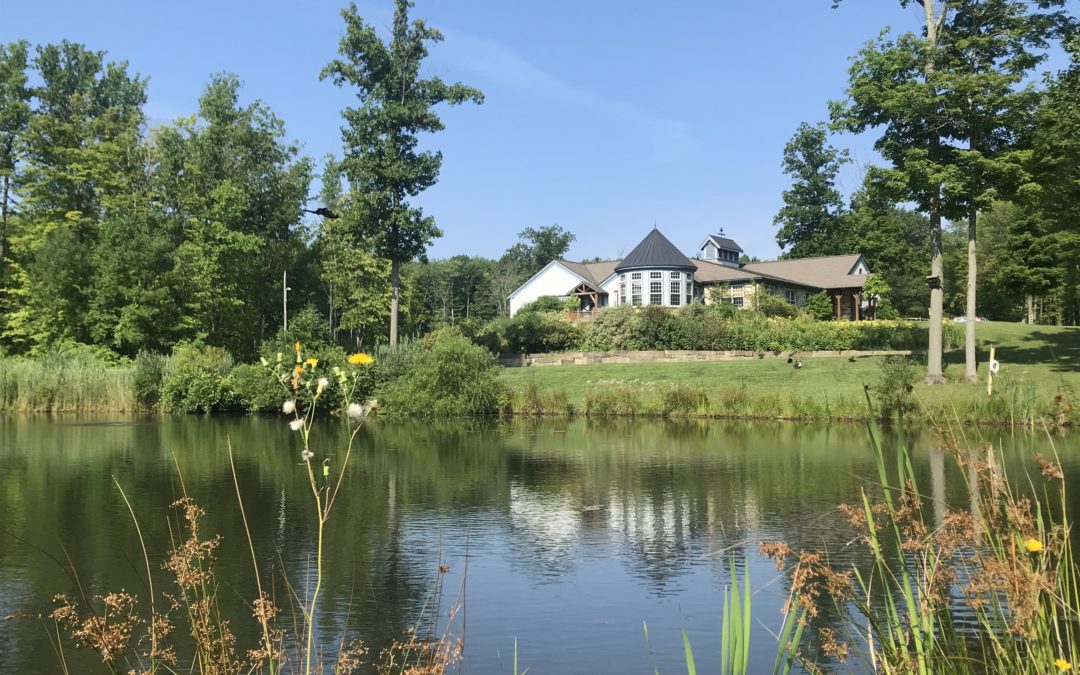
Hershey Invites You To Its Adolescent Campus Weekend Open House
We warmly invite you to be our guest and take this opportunity to learn about our Adolescent program and curriculum from our staff and students, as well as take a guided tour of our campus.
Join us for a Saturday Open House on October 17, 2020 from 10:00 am – 12:00 pm.
Gain a greater understanding of Montessori education, how Hershey Montessori emphasizes the connection between school and family, school and student, and student and family, and learn why Hershey students love school.
Hershey Montessori School is dedicated to keeping the health and safety of both our school community and those interested in learning more about Hershey. Our Open House will be split into 2 registration times and pre-registration is required.
In keeping with CDC guidelines, upon arrival, visitors will be asked to take their temperature (a temperature of 99.9 or greater will result in having to exit the premises and reschedule for another time), use hand sanitizer, wear a face-covering/mask, and keep physically distanced when interacting with others.
If you have questions about the event, please do not hesitate to contact Hershey Montessori School’s Office at 440-357-0918 or admissions@hershey-montessori.org.
An Open House for our Birth – 6th grade campus is also being held on October 18th from 1 pm – 3 pm.
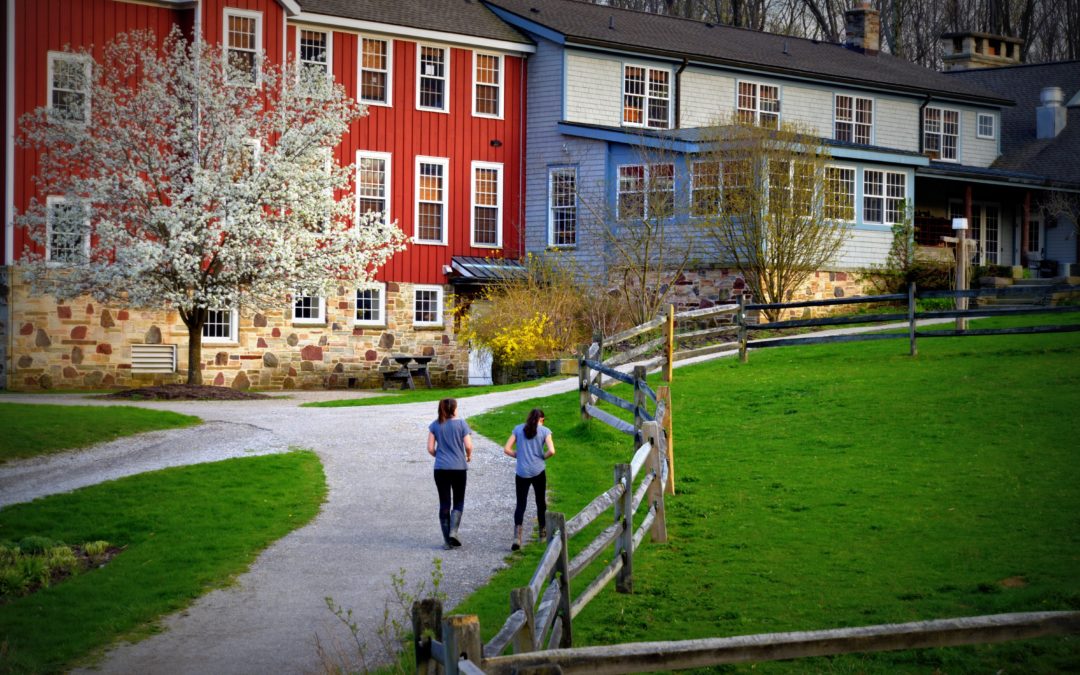
Hershey Launches Reopening Plan
Staff eager to welcome new and returning students to campus
Much of Hershey Montessori School’s staff and faculty spent the summer redesigning their campuses, classrooms, and education platforms. Their goal has been to ensure Hershey’s high-quality programs continue to serve students, staff, and families’ needs, while still maintaining an authentic Montessori approach.
Hershey is slated to reopen both campuses later this month with a redesigned face-to-face learning experience for all students. An enhanced remote learning option is also being offered to adolescent students. The on-campus designs are centered around small cohorts of students and implementing all recommended health practices, while enhancing the experience by availing of as much education in our outdoor environments as possible.
“The aspects we learned from last spring’s unexpected launching of remote learning created the opportunity to greatly enhance our remote learning experience,” said Head of School, Paula Leigh-Doyle. “Significant purchases of new technologies will allow for greater engagement and a more interactive experience for our students.”
The school recently released its Healthy Reopening Family Manual that provides insight to its plans and protocols for each educational level of the school. The manual also outlines health and safety protocols and various measures that have been implemented to ensure the well-being of Hershey students, staff and community. The highly-detailed plan is the result of collective input from faculty, staff, students, and parents through surveys and feedback, as well as the collaboration of Hershey’s Contingency Planning Team. The manual, already on it’s second edition, will evolve as new information and recommendations are brought to light.
Ohio’s governor is set to provide additional school guidelines on August 13th. Hershey will make an announcement to its school community on August 14th regarding any changes or additional information that needs to be communicated based on the outcome of the governor’s press conference.
We recognize the the state of uncertainty that we all have endured since the start of the COVID-19 pandemic. Many families are still seeking school options. Hershey is still accepting applications for fall enrollment. We are prepared, and we are excited to safely welcome new and returning students this fall!

Are Hershey Graduates Prepared for College?
An Interview with Hershey Montessori School Alumni
Hershey Montessori School delights in welcoming back its graduates and former students. We love to hear how they are tackling life and college after high school. We seek to know how their Montessori education helped shape and prepare them for the paths they chose. We love learning more about where they are today, and how their skills are helping them on life’s journey.
At the last alumni gathering, Hershey graduates shared with us what course of study they are pursuing and what university they are attending. We then asked them to speak to how they felt prepared for where they are on their journey. Below is what they shared.
Ilana Rosenheck ’18, Psychology, University of Cincinnati: “I think the farm, or Hershey or Montessori in general, has really prepared us for public speaking. We all did countless presentations and that really developed a confidence in all of us – or most of us. I feel like if we had an issue or a question, we all felt comfortable with going to our professors and talking to them just because we have that close relationship with the staff here. It’s something I feel like traditional schooling won’t teach their students. Hershey taught us about being a functioning adult. I feel like Hershey really prepared us for life.”
Cameron Zona ’18, Theater and Entrepreneurship, Lake Erie College: “Yeah, I have to agree. I was here on campus on Monday and I sat in on a class of Middle School students and they were giving presentations, and I was like ‘these presentations are better prepared and they have better public speaking skills than the students that are in some of my college classes.’ I was very impressed. I definitely think that it is something that when students graduate, they have a firm grasp on.”
Makenna Venaleck ’18, Chemical Engineering, Ohio University: “I don’t do a lot of presentations or public speaking in my area of study, but I will say that I felt very prepared to talk with my professors and have a little bit of an up because even though a lot of people in STEM are very good at math and science, they can’t really communicate what they are studying or how they are feeling or talk to their professors or to a potential employer. I went to the career fair and I felt very prepared because I could set aside ‘What are my skills? What are things that I am good at?’ and I could have a conversation with someone that maybe would employ me or was a professor. I felt very prepared for interpersonal communication.”
Erin Finan ’19, Journalism, Ohio University: “I think Hershey helped me (or Montessori) in a lot of ways, but especially when I went to college and I was trying to find my friend group. The people I connected with like at Hershey really helped me to know the kind of people I wanted to be around and know how to find my tribe. Taking that to college made it a lot easier to find people and know that these were the people that I wanted to spend time with and be around, and that I wanted to form my friend group with. I mean, college has more people so you have to adjust because of that, but you also have to know that there are people like you and for you at college that you’ll be able to connect with in the same way you connect with people here. You might have to look a little bit harder because it’s such a bigger environment, but like I said, Hershey helped me and a lot of us know who we wanted as our friends and the things we value. When we find those [values] in other people, it’s easier to make those connections.”
Elise Spintzyk ’18, Psychology, Ohio State University: “I think Hershey prepared us well because we had a lot of leadership opportunities. I think students who are looking to move forward into a graduate program or even to apply for a job are able to step into a leadership role. While you are in college that is something that is really important and important for your resumé. Already having had a leadership role with experience, I can bring that in as a freshman student when applying for a position on an executive board of a club, something in your department, or looking for a research position if that’s something you’re interested in. Those are things that you wouldn’t already be taking with you from most high schools. I think a lot of students haven’t had the opportunity to do so. When you step into those roles when you’re in college, you are very well prepared for them and you’re able to thrive in that position and keep moving forward.”
Thank you, alumni, for sharing how your Hershey Montessori School experience and skills have helped aid you in your college education and beyond. We are please that you were able to take leadership, communication, interpersonal skills, public speaking, real-life capabilities, and tools to navigate and find your way in the next steps of your education. We wish you all the best. We truly look forward to seeing you all again very soon!
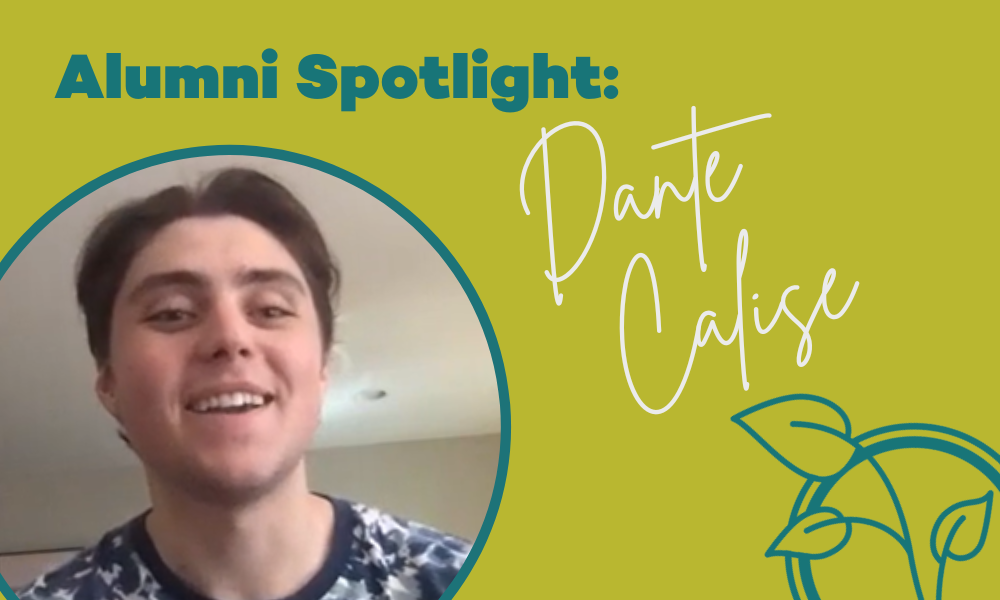
Interview with Hershey Alumn, Dante Calise
In the midst of the COVID-19 pandemic, our Head of School Paula Leigh-Doyle, met with former Hershey Montessori School student Dante Calise, via Zoom. Paula had several questions, many of them relevant to the times we’re living in.
Here is their interview conducted in May 2020.
[Paula] This is Dante Calise. Dante is interviewing with us from his home in Northbrook, Illinois. Dante, why don’t you tell us a little bit about your life journey? How old were you when you started Montessori?
[Dante] Sure! My parents like to say I was Montessori from the womb. Both of my parents are in Montessori education — they’re both trained in elementary and adolescent. My mom also worked as a toddler and primary teacher. I attended a primary Montessori school where I was taught by another family member, my aunt, at Countryside Day School. In 7th grade, I moved on to Hershey, and I was at the Hershey farm school (Huntsburg Campus) from 7th-9th grade, when at the time, Hershey did not have an upper school. I then went on to the Montessori high school at University Circle in Cleveland through 12th grade. I then ended up at the University of Delaware for my undergraduate, which I am now just finishing off. There, I studied molecular biology. I participated in a lot of research and am now headed off to the University of Wisconsin to start a PHD program in microbiology in August.
[Paula] Wow, that’s so exciting. So you’ve been accepted into that program?
[Dante] Yeah, I have.
[Paula] Congratulations, and so we have a few topics that we would like you to share some reflections on. When you reflect back on Montessori and your life experiences and environments, how do you think it has affected the path you’re choosing now, how it has contributed to your involvement with the community or the environment? How were you able to adapt to the academic expectations in college after being in Montessori schools? During this time of great challenge with COVID-19, and having to move onto your PHD program, what are some of the things that have helped you navigate challenge?
[Dante] I’ve been in Montessori all my life, up until college, which in a sense I feel like is quite similar to Montessori itself. I think that having had a Montessori education and background really created my excitement and interest for learning. That really is what has determined the trajectory of my academic career as well as I think my professional future. I’m going into research as I said, and really what drew me to research was just the fact that it’s kind of an opportunity to be a student for life. I’m always learning. Before the high school level there were no quantitative grades that I received and I always had control over what I wanted to learn and the paths that I wanted to follow.
[Paula] So as you mentioned that you didn’t have grades when in the younger years of Montessori, you were measuring your own work and choosing your own course of learning.
[Dante] Yes, so I think that the lack of quantitative and comparative evaluation against other students and my ability to choose what I was learning really let me get excited about the material and excited about the learning. I think if I had been receiving scaled feedback early on, it may have discouraged me from really committing to what was really important and that was the content. So I think that was a big part of how I grew to love to learn.
[Paula] When you got grades either in high school or in college, was that hard for you to move into that world?
[Dante] Interestingly, the first formal letter grades that I ever received were in 9th grade at Hershey and I actually was kind of excited. By that point I’d had enough time to learn to love school and really to fall in love with the classroom. I saw them as an opportunity to show my commitment to learning and into the material. It was exciting to see that someone acknowledged my commitment. I found that it was a pretty smooth transition.
[Paula] Did you have any real stretches academically in your undergrad?
[Dante] One of the biggest challenges for a lot of people in college is the shift from high school to college in terms of self-advocacy and the amount of self-advocacy that’s necessary. College almost always is larger than the high school you went to and there are thousands of students and many busy faculty members. You need to advocate for yourself a lot more than you might have in high school. I think people really do struggle with that in college. I think that having so much control and having to take initiative in my own education in the Montessori setting set me up very well to be able to succeed in college. I already knew how to reach out and advocate for myself quite well.
[Paula] Your relationship with your professors, how did you navigate that? It was easy for you to advocate for yourself?
[Dante] I didn’t have really have any trouble with my relationships or any interactions with professors. I generally had very good relationships with professors. Many professors I expect to remain in contact with after I graduate this month. I definitely think that is related to my education beforehand. At Hershey, there was always a very mutually respectful, and I would say mutually invested, relationship between teachers and students. I took that with me as I went on to college and not so much assumed but decided that’s how I wanted it to be in college as well. I would say that I never had any resistance from professors. I didn’t go to every professor’s office hours but when there was something that I wanted to talk about after classes, I would have thirty or forty minute conversations with them. I often got complements from professors about that, which showed that they really did appreciate it.
[Paula] Not every student in college has the confidence to initiate conversation with a teacher or someone that they think, thinks differently to them, and you seem to have ease with that. How about collaboration with peers, what was that like at college level?
[Dante] One aspect of college that is a challenge to many incoming students is moving away from home. One part of that is potential homesickness, and learning to live independently. Another part of this is also living in a physical space with other people. I already had that advantage from living at Hershey and the high school. I think especially having gone to boarding school, it prepared me well for any sort of work I would have to do with my peers in college. I would say I’ve really only had positive relationships with peers in the past four years, and I think a lot of that has to do with the skills I came in with.
[Paula] It sounds like you had the tools you needed to take on challenging problems, and they didn’t become big problems because you seemed to have the tools to manage them.
[Dante] Yes, whether I’d seen the problems before or just had the skills, I was basically able to overcome any hurdles I saw in college.
[Paula] So, a PHD in microbiology, tell us a little bit about that. You’re a passionate learner, you’re curious about everything in the world, from language to science. You’re narrowing down to this specific field, what’s calling to you about it?
[Dante] So a few things sort of guided me down this path into microbiology. I would say first was actually a class specific to viruses. My professor was a very engaging teacher and did a very good job of showing the relevance, and certainly that relevance is clear now we’re living in a situation where a virus is wreaking havoc on the world. The second component was the hardest part of finding out which area of biology I would like to pursue after my undergraduate. I fell in love with biology in ninth grade at Hershey. I can’t say I’ve ever heard another student describe a program that even compares to what I got to do. There was such a huge amount of hands-on learning in all the sciences at Hershey, for example, Occupations — that is very hands-on. To be able to go out into 90 acres of forest and document each class of vertebrate, to understand our own soil, to understand our own watershed. That really got me excited about biology. I like to look at things as a whole, so with humans or with animals in general, it’s very difficult to look at them on a whole organism level because they are just so complicated. With microorganisms, I found that I could look at the whole thing at once and I really like that about it.
[Paula] At that notion, of seeing the whole and that notion of the interaction and interdependence of an organism within an environment and how it works as a whole, seems to be a common thread in alumni that I’m hearing from. To say I don’t want to know just this one thing inside a box, I want to know all the parts and how they interact and relate to each other.
[Dante] Yes, and the idea of how one component fits into a bigger system has a lot to do with the importance of Montessori and the importance of a community that you leave Montessori with. I always think of my own impact on others and my own impact on the community, and that’s definitely true for biological things too.
[Paula] Yes, and my goodness, your contribution to community in your study, its going to contribute to humanity.
[Dante] That was part of the attraction of biomedical research for me. I’ve always known I’ve needed to do something that did something for someone. I think I’m young, but I do think about the impact that people leave after they’re gone on the world, and I really think it’s measured in the impact you’ve had on others. When I think about the science of it, that’s what it boils down to, is you leave some physical matter yes, but how you are remembered is what you are after you’re gone. I just think, well, what is the point, if not to help others have it better?
[Paula] Beautifully said, so you really have a wisdom beyond your years. If I come back and interview you when you’re 90, and I’m wondering… you probably will be saying the same thing. So studying science and studying things like a virus is going to be really meaningful and helpful for us as an entire civilization. Also just how we interact on our earth and how we are effecting all the aspects of the planet and how we can better live on it. During these challenging times, how have you been able to manage your stress?
[Dante] I will say, I do think Montessori has, for this COVID specific situation that we’re in right now, I think Montessori definitely equipped me, in very unique ways, that perhaps other people might not have. That’s really the sense of community membership and seeing yourself in the greater picture — and it matters. What I do really matters. Every little thing can impact someone else, and that’s absolutely true of the situation we’re in right now. I think those raised in Montessori have that advantage in the fact that they already recognize their impact on the world around them. So in a time where it really matters, they’re ready to do their best as citizens of the world.
[Paula] That’s beautiful, that gives me hope. I think you’re a bit of an optimist in a realist because you’re grounded in science and human history. You’ve studied how humans behave and respond, yet I hear an optimistic voice that you’re prepared to change path and the next challenge will give you more information and it’ll keep influencing where you go next. I think at the core, your self-awareness and your awareness of others is a beautiful, powerful thing and that’s influencing your choices and it benefits us all.

Hershey Guide Shares Keys to Supporting Montessori Education Online
“For the adolescent, it is critical that we make our learning child-directed and that we continue to make student choices a priority.” ~John Buzzard
Hershey’s John Buzzard recently shared with the International Montessori Training Institute how he’s transitioned his Upper School Integrated Humanities projects to a distance, online education learning model. Below is an excerpt of what Buzzard wrote:
Because we value face-to-face, social interaction and hands-on learning in Montessori education, we must strive to keep these as key elements of the learning process, despite our current social distancing situation. This requires some adjustments, but can still be accomplished. As we consider our move towards working with our students in an online education environment, we should pause to consider how to make this approach as true to the Montessori pedagogy as possible. Even using technology and new methodologies, we know that the truths of Montessori remain valid and will want to design our educational program with them in mind.
For the adolescent, it is critical that we make our online education child-directed and that we continue to make student choices a priority. Our choice of strategies in the online environment can be shaped by philosophy, and just as in other environments, we find teacher-centered learning and student-centered learning occurring. Because students are working more independently, there are many ways to structure the learning to be student-centered, and we want to take advantage of the computer and the students’ home environment to emphasize these possibilities.
Creating social elements is also key to making the online learning experience truly meaningful to adolescents. Don’t merely focus on academic interactions – think closely about how to use video, dialogue, discussion, and activities to build connection and social dynamics with the group. Although we accept that this will be a less authentic community experience than actual face-to-face interaction, we must continue to make that element of adolescent development primary.
As always, there is a tension between the need for student-centered learning and the need for a prepared environment. In a Montessori school, guides know that maximizing student choice often begins with carefully constructed environments and experiences. We must shift this thinking to the online world, creating prepared virtual environments and experiences that continue to support student learning without superseding it.
Ultimately it is the three-stage learning cycle that shows us the way to structuring our online education environment. This approach maximizes student choice while providing the prepared environment structure that students need to do their best work. This three-stage cycle is built on three natural stages to the learning process – key lessons, individual research, and meaningful presentation.
This approach maximizes student choice while providing the prepared environment structure that students need to do their best work.
Read John Buzzard’s detailed lay out of the three-stage learning cycle here.
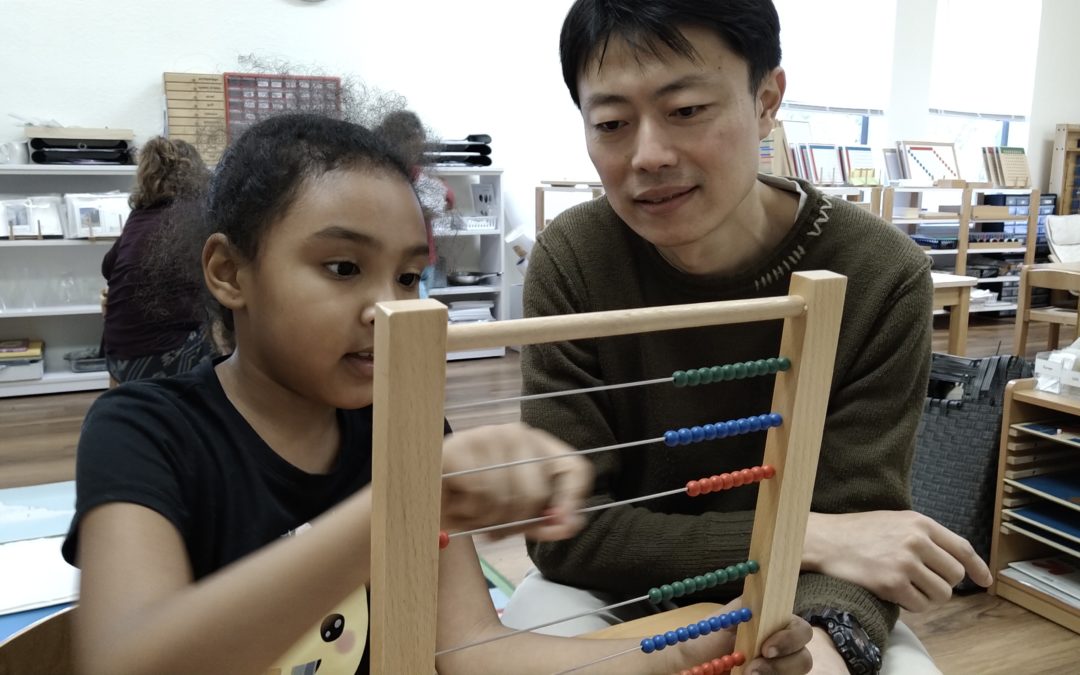
From Taiwan to Texas to Hershey
“To say it is a good school is not enough. If you have a chance, come here and observe. You will feel the difference. It is so peaceful and calm. Even the teachers and adults are calm. You will see real Montessori.” ~Derek Tsai
An Interview with a Teacher in Training
Hershey Montessori School was pleased to host Derek Tsai for five weeks of teacher training recently. We extend a special thank you to Jennifer Finan, Early Elementary Guide, for her exemplary role modeling and her passion to help others live, teach, and share Montessori.
teaBelow is a short interview between Head of School Assistant, Saren Peetz, and Derek Tsai.
Saren: What is the correct spelling and pronunciation of your name?
Derek: Derek Tsai (Tsai sounds like “Thai”).
Saren: Where are you from?
Derek: I am from Taiwan originally, but moved to Austin, Texas about 4 years ago.
Saren: Do you have a school you would like to work at in Austin, or are you starting your own school?
Derek: When we moved from Taiwan, my wife and I started a small school. It is a bilingual school with Mandarin and English.
Saren: Does your school have an elementary program yet, or is it only Children’s House?
Derek: Only Children’s House for now, but we are going to be growing to elementary. The parents of the Children’s House students asked for more levels to be added. I also have a 6 year old daughter, so it is good timing. We want the elementary for her as well.
Saren: What interests you about Montessori education?
Derek: I started working in Montessori as a helper to my wife. My wife is the Children’s House lead teacher. She knows a lot about the Montessori theory. I discovered through that work that I really loved Montessori. When I was helping my wife, I knew the names of the materials, but I did not know the use of them. But then, in my training, I took the Foundation Course and then the Elementary Course. After I learned the theory of both the Children’s House and Elementary I thought, “Wow, that is what I want.”
Saren: What does the landscape of Montessori look like in your home country/state?
Derek: I will start with Taiwan. In Taiwan there is not much land, especially in the cities. There are no backyards, only ten story buildings. It is very challenging for preschools to operate. The preschools usually rent out the first or the second floor of these tall buildings and they will use parks for playgrounds. Austin is more similar to preschools everywhere in the United States. There is more room. Hershey is unique, though, especially its playground. The playground has a huge space to run and build with sticks. It is very natural and very Montessori.
Saren: What brought you to Hershey?
Derek: I took the training course in Zhejiang, and a few of my classmates on the course came to Hershey a few years ago to see the upper school (Middle and Upper School) for the adolescent orientation. They loved Hershey, so I thought if I can do my observation there it would be good. So I contacted the school and contacted Jennifer and set up my practice teaching at Hershey.
Saren: When do you finish your training?
Derek: There are five time blocks for my training. The last training block is in February, and that is the oral and written exams. Then I will come back to my wife’s school to open the elementary classroom in September or maybe earlier.
Saren: What is your biggest take away from Hershey?
Derek: My biggest take away was Jennifer’s attitude and her spirit. She enjoyed her work and all the children are engaged in their work. I hope I can be a guide like that. It is not easy in teaching to get all the children engaged in their work. But she did it! So maybe I can do it, too. Also, the design of the building at Hershey. It is good for children because it is easier for them to go from elementary to another class, or even back to the Children’s House. And also easy access to outside, especially for the Children’s House. They have their own yard and all the windows in their classrooms let them see outside and watch outside. I also loved all the books. There were so many! I loved the library. There are so many things I loved I can’t list them all right now.
Saren: What is one thing you would tell parents about education?
Derek: Many parents are still believing in traditional education and public school more. But when talking about Montessori, the Montessori way is to put the abstract and the physical thing together to make the whole concept very solid. I would also want to really let parents know what the difference is between Montessori and traditional education. I would say the two biggest things for elementary are independence and Cosmic Education.
Saren: What is one thing you would tell other educators about Hershey Montessori School?
Derek: To say it is a good school is not enough. If you have a chance, come here and observe. You will feel the difference. It is so peaceful and calm. Even the teachers and adults are calm. You will see real Montessori. The physical design even looks like home. It makes the whole layout look like a home. If I hear someone is looking for observations or help, I will suggest they go to Hershey Montessori School.
Best wishes to you, Derek. Thank you for sharing your experience with us. We enjoyed having you here at Hershey Montessori School, and are glad that you are taking a piece of us with you as you provide Montessori for more children in your corner of the world.

Hershey Senior Represents Education in Meeting
Abriella Minotti, a senior at Hershey Montessori School, recently spoke at the State of Geauga forum held at Kent State University’s Geauga campus. A group of approximately 150 politicians, business owners, educators and residents gathered to hear and to talk about what’s happening in Geauga County. The views shared reflected past progress, current status, and gave a glimpse into the future.
Minotti addressed the topic of Education, including the innovative programs at Hershey’s Huntsburg campus, which is home to the school’s Adolescent program. She extended an open invitation to the Geauga County community to visit Hershey Montessori School.
As a senior, Minotti serves as an adjunct staff member for Hershey’s Admissions Department where she provides presentations and tours to families, individuals, and organizations interested in learning more about the school. You can learn more about the Hershey Montessori School admissions process here
Other speakers addressed the areas of Agriculture, Arts & Leisure, Business, Government, Health & Safety, and Human Services.
You can read more about this in the Chagrin Valley Times.

